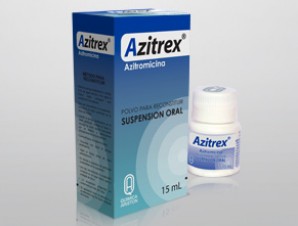
|
|
Search Medicine: |


Macrolide antibiotic
COMPOSITION: Each 500 mg coated tablet contains 500 mg of Azithromicindihydrate equivalent to 500 mg of Azithromycin basis.
POWDER FOR SUSPENSION: Each 5 mL of suspension contain 200 mg of Azithromycin basis.
USES AND ADMINISTRATION: For the treatment of infections caused by susceptible bacteria, including otitis media, pharyngitis, tonsillitis, respiratory tract and skin infections. It is used for the treatment of infections by Mycrobacteriumaviumcomplex (MAC), in the prophylaxis of bacterial endocarditis. It has been tested in toxoplasmosis, chlamydia, and gonorrhea. It is administered orally as dehydrate; the doses are administered in terms of the base. Doses should be administered at least one hour after or two hours before meals. The usual dose is 500 mg daily in single dose for 3 days. An alternative is to administer an initial dose of 500 mg followed by 250 mg daily for 4 days more. The usual dose for uncomplicated genital infections due to Chlamydia trachomatis is 1 gram azithromycin as a single dose. A single 2 g dose can be given for uncomplicated gonorrhea. For prophylaxis of MAC disseminated infections 1.2 g of azithromycin is administered a week. For other infections produced by susceptible organisms, including otitis media, respiratory tract infections and skin infections, the suggested dose for children is 10mg per kilogram of body weight once a day for 3 days. An alternative is to administer an initial dose of 10 mg per kilogram of body weight and followed by 5 mg per kilogram of body weight daily followed by 4 days more.
Azithromycin is used in the treatment of infections by Mycobacteiumavium.
ADVERSE EFFECTS AND PRECAUTIONS: Gastrointestinal discomforts are most common side effects, being usually mild. Class FDA: 1B. Pregnancy: Category B.
CONTRAINDICATIONS: Patients with a history of sensitivity reactions to Azithromycin or any other macrolide.
DRUG INTERACTIONS: Other drugs may interact with Azithromycin. Consult your physician if you are taking anticoagulants (such as warfarin), anticonvulsants (such as phenytoin or carbamazepine), and antihistamines (especially terfenadine and theophylline). Antacids containing aluminum or
magnesium can interfere with the absorption of Azithromycin. The use of Azithromycin and antacid must be separated at least 2 hours.













